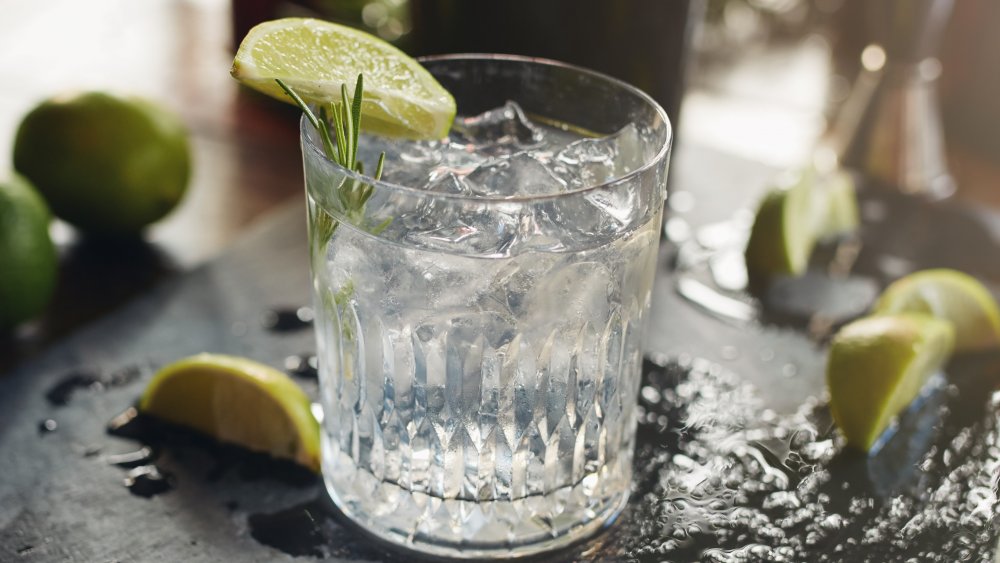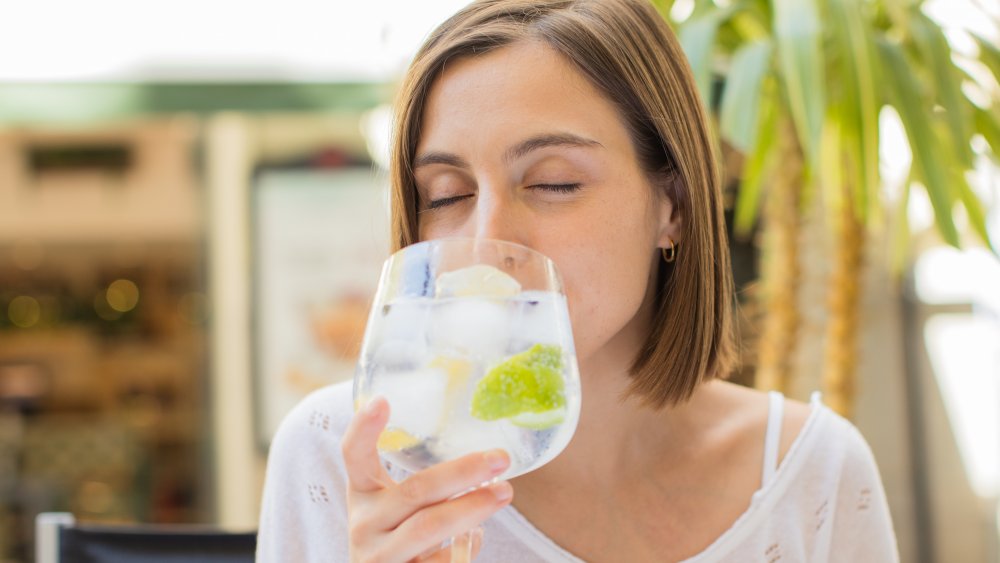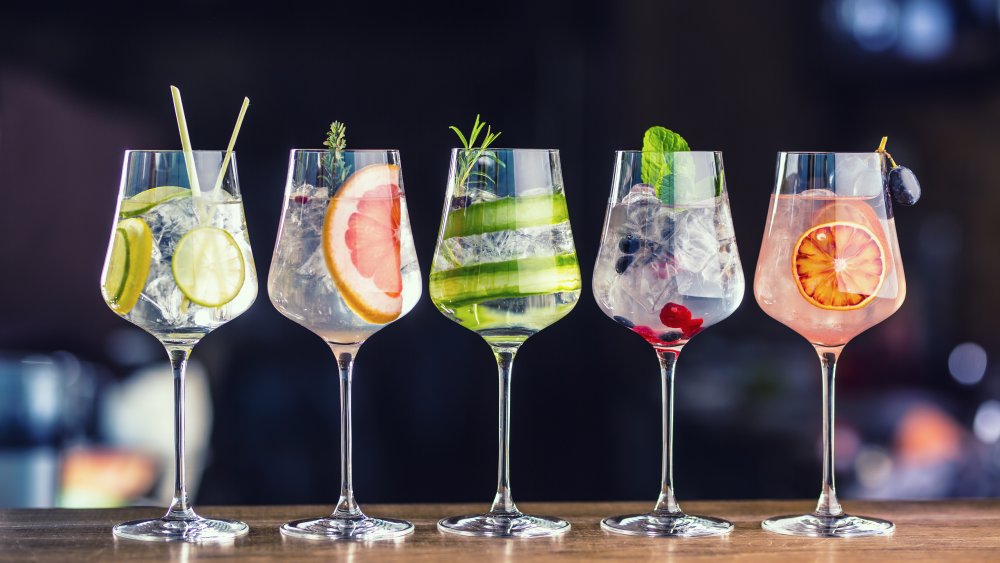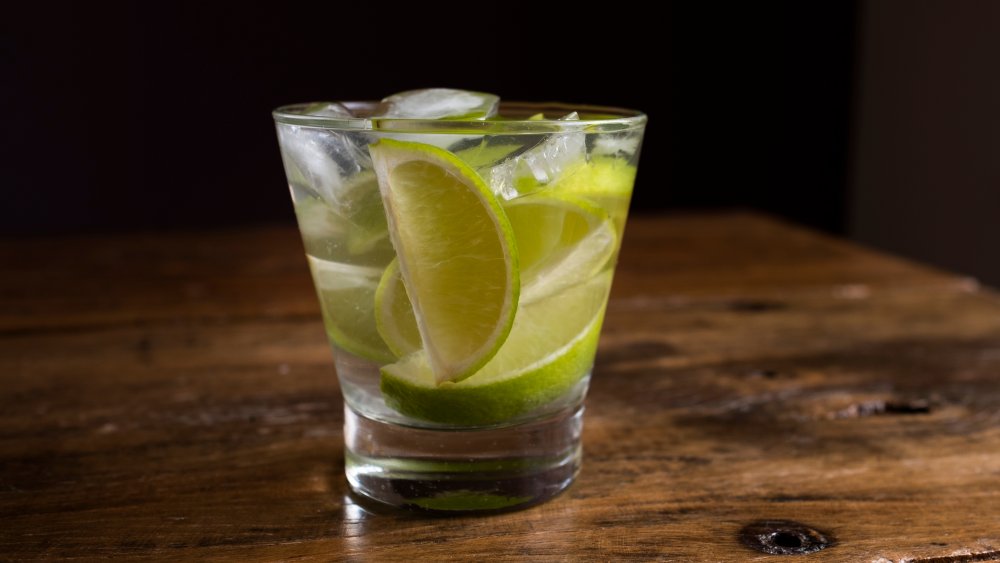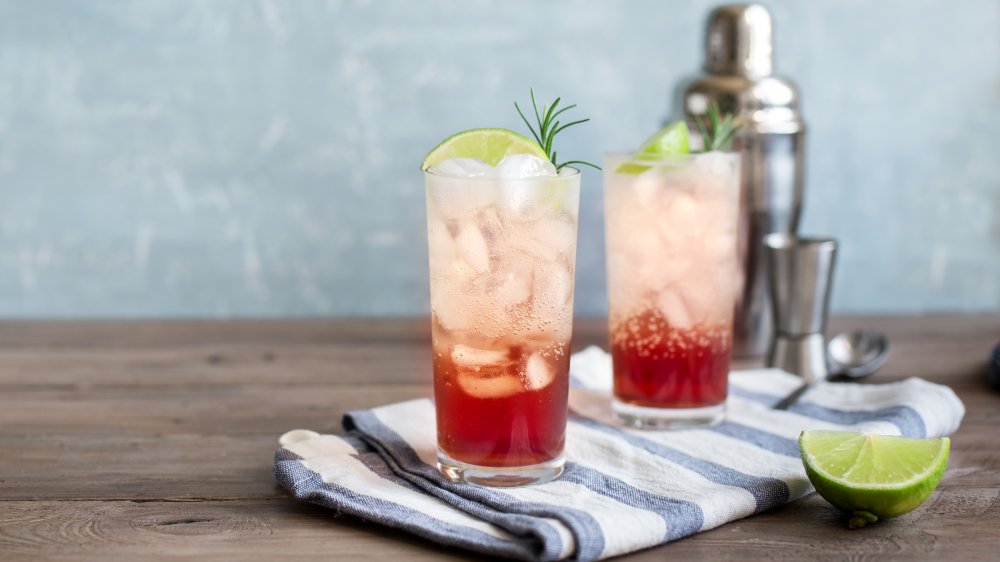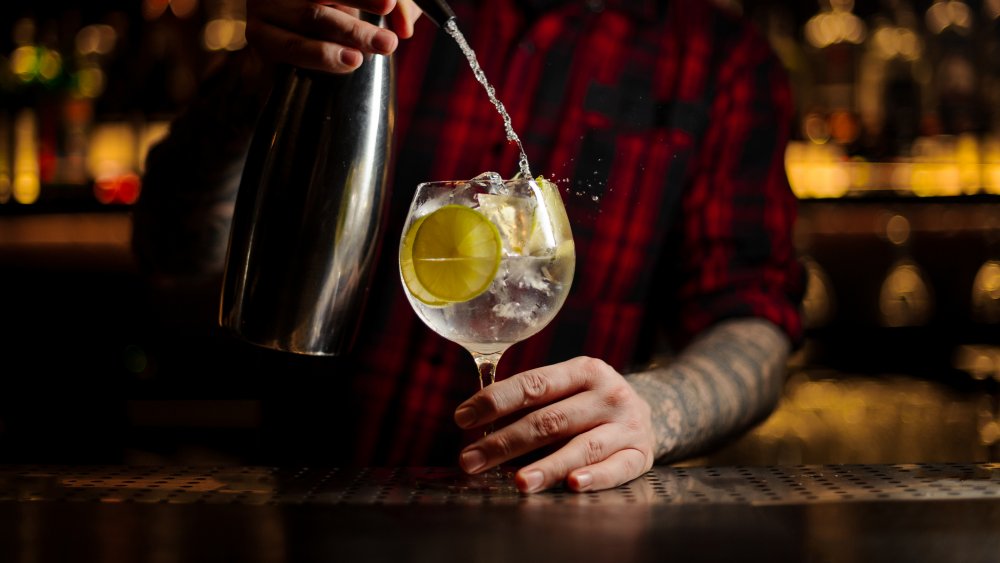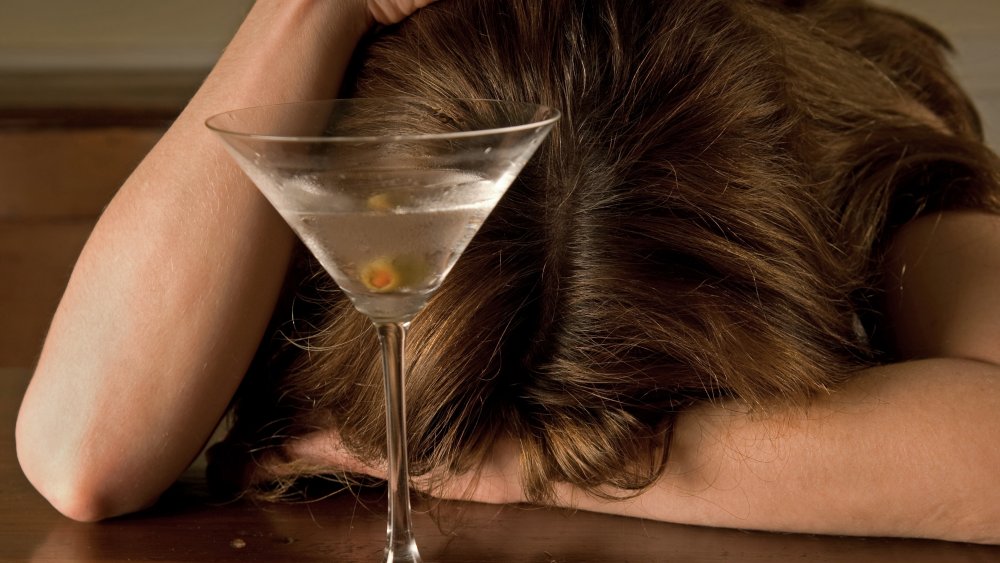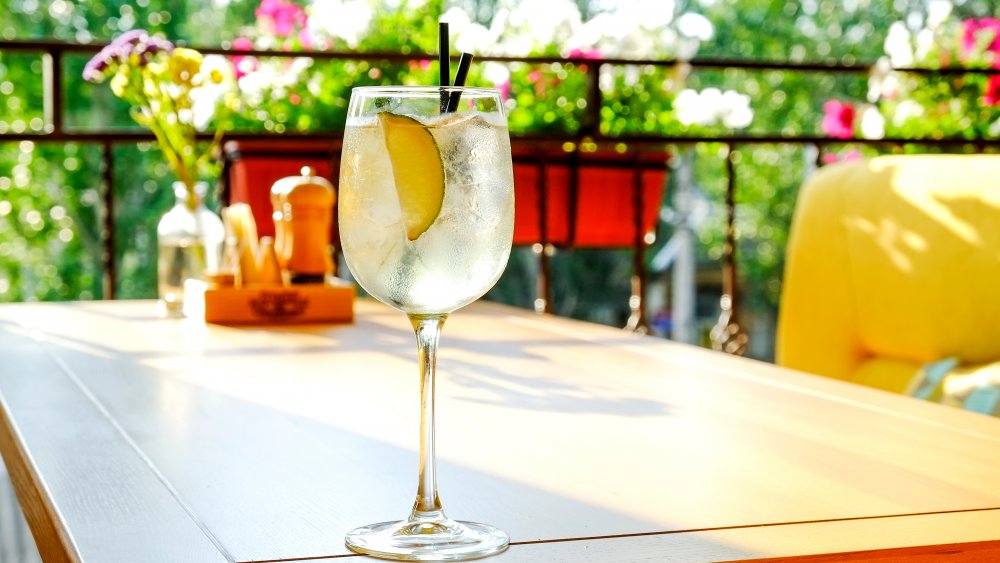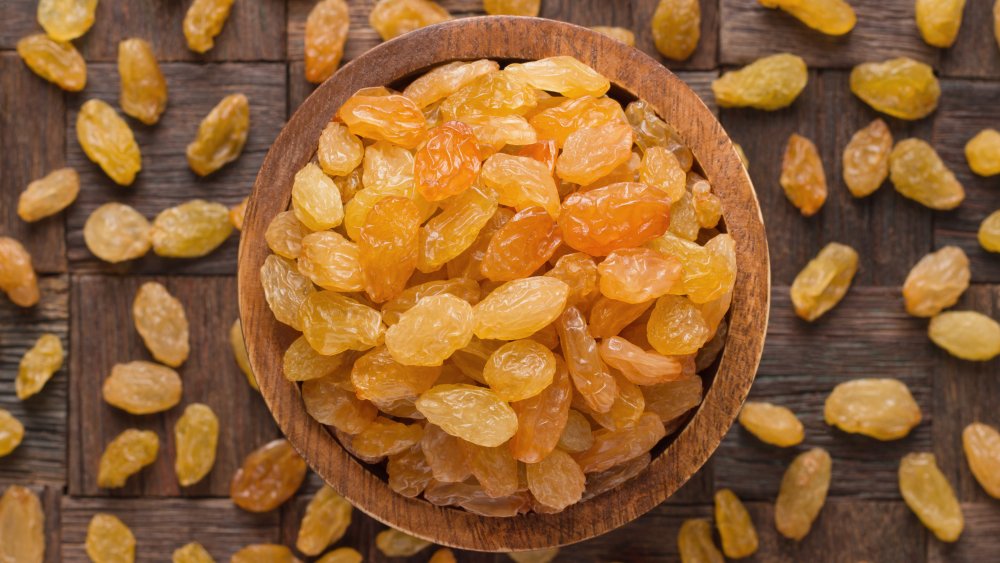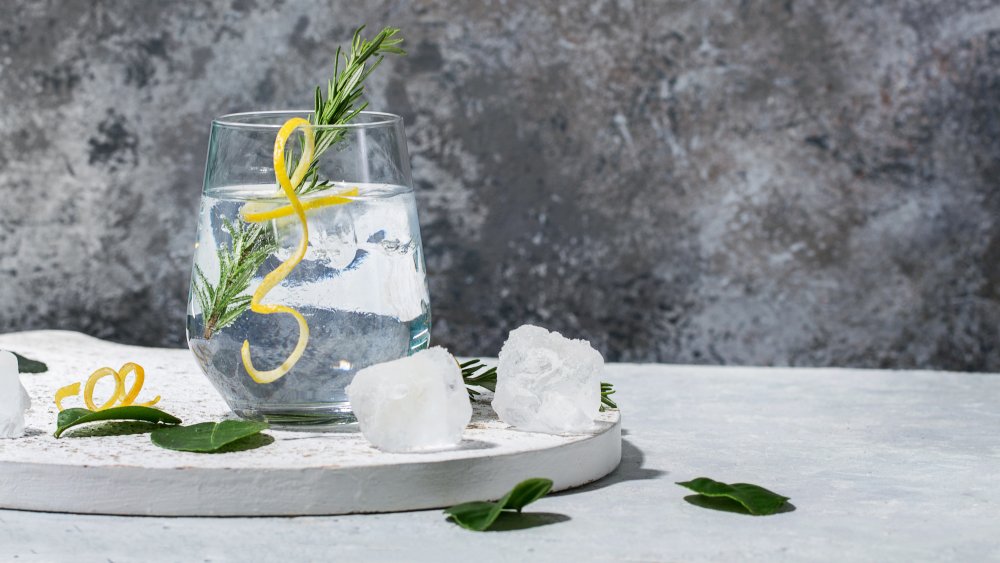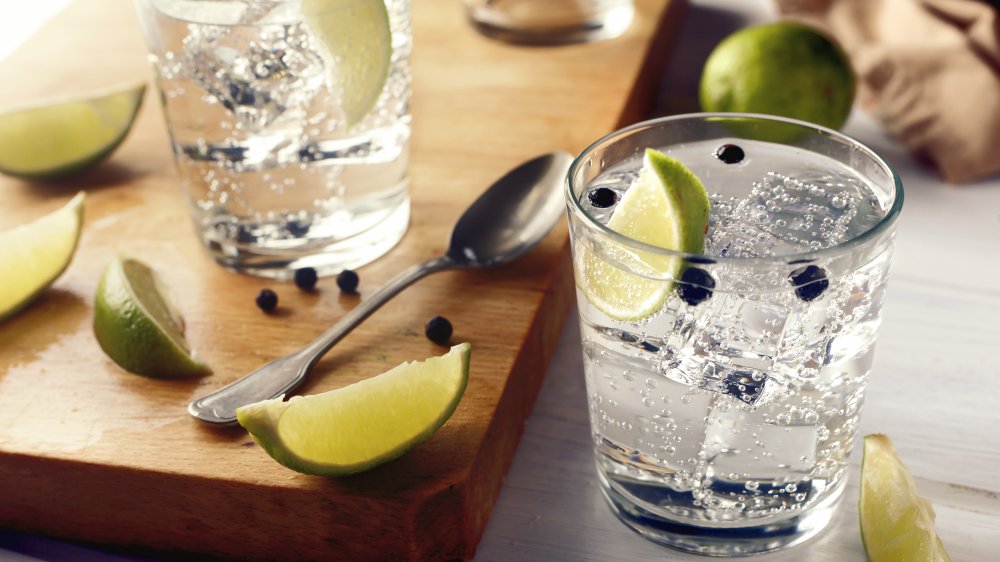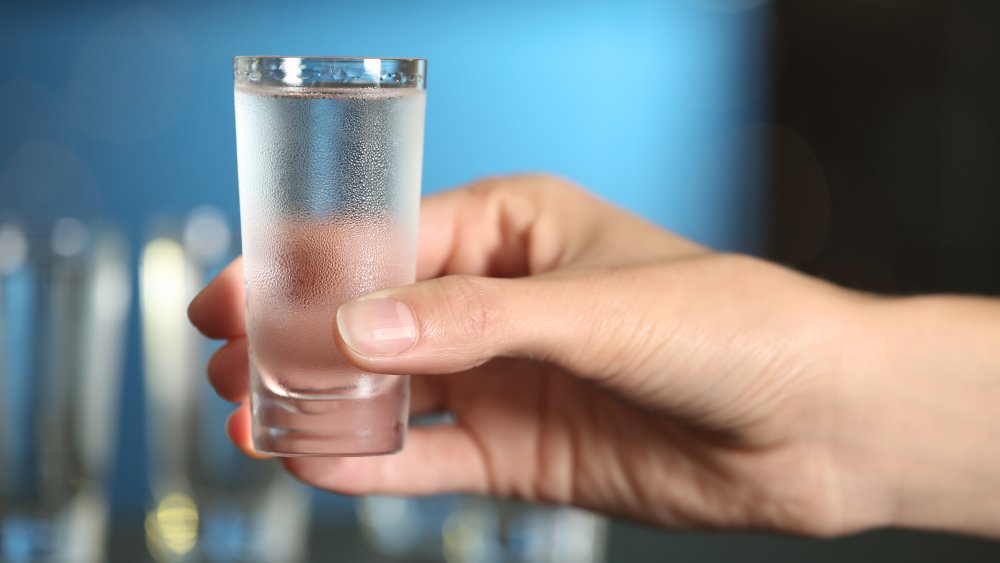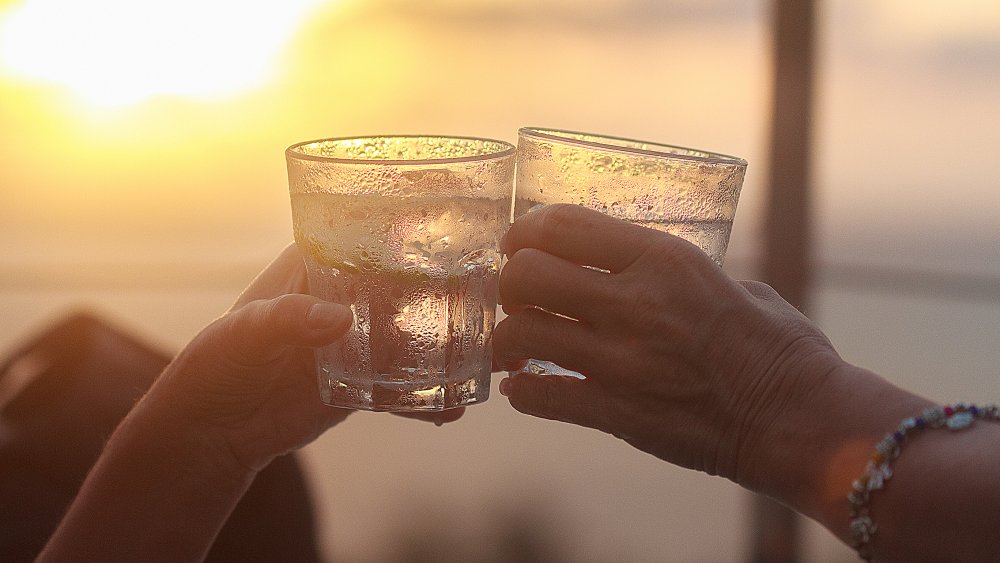When You Drink Gin Every Night, This Is What Happens To Your Body
Whether you drink gin every night in a martini or mix it with tonic water, you may be wondering what this alcohol does to your body. First, it's important to know what gin even is. While straight gin may not taste overly flavorful, it is flavored. Sam Carter, senior brand ambassador for gin distillery Bombay Sapphire, explained to Good Housekeeping that gin is made from and flavored by juniper. While gin can contain other natural ingredients, such as wheat and rye, juniper must be the plant predominately used. Otherwise, it's not gin.
There are different types of gin on the market, but, according to Carter, London Dry Gin is of the highest quality. "It's kind of gin in its purest form," he explained. In order to be classified as London Dry Gin, the distillery "can't add any artificial flavourings or additives after distillation." You can also buy "distilled" gin. Like London Dry Gin, this gin is, of course, distilled. It differs from it's superior cousin, though, because flavorings are permitted after it's distilled.
So, now that you've aced Gin 101, let's move on to the health portion. When you drink gin every night, this is what happens to your body.
Your indigestion may improve if you drink gin every night... or it may get worse
Could a gin and tonic really get rid of your indigestion? Some people have claimed that juniper berries — the predominant ingredient in gin — has helped abate symptoms related to the condition, including bloating, nausea, and heartburn, according to Very Well Health.
Despite this anecdotal evidence, though, there's no solid medical proof to back up people's claims — at least not in humans. A 2007 study conducted by researchers in Canada did find that juniper berry essential oil helped improve digestion in cows (via Very Well Health). However, it's also important to note that, while some people find heartburn relief from gin, others may experience worsening symptoms.
Kevin Ghassemi, a gastroenterologist at the University of California in Los Angeles, told NPR that alcohol in general has a temporary but "direct effect" on heartburn. This is because alcohol can relax the muscles that connect the stomach and esophagus. "The muscle is supposed to be closed, except when food is passing into the esophagus," the doctor explained. If alcohol relaxes that muscle, as it has a tendency to do, stomach acid is able to "come back up into the esophagus, and that's reflux." So, if you drink gin every night, you may worsen acid reflux symptoms.
FYI, you might want to avoid carbonated beverages, too, as it's one of the worst things for acid reflux.
You may be able to ward off certain diseases if you drink gin every night
Researchers in Australia studied the relation between juniper berries and bacteria and found that these powerful berries were able to "block the growth of bacterial triggers" of three major health conditions: multiple sclerosis, rheumatoid arthritis, and ankylosing spondylitis. Juniper berries also showed promising signs of being able to help treat certain types of cancer, according to the study.
A 2014 review conducted by researchers in India further revealed that the juniper plant has also been credited with antimicrobial, antifungal, and antioxidant activity, which bodes well for it's bacteria- and cancer-fighting potential. While gin is the only alcohol that contains a high concentration of this superfood, it is still alcohol — a known carcinogen.
Yet and still, moderate consumption is generally considered safe. Theresa Hydes, a researcher at the UK's University Hospital Southampton, told Discover that a person's risk of developing most cancers "does not increase significantly until an individual starts drinking heavily." While you shouldn't look to gin as a miracle cure, choosing to drink gin every night is likely safe.
You could lose weight if you choose to drink gin every night, as opposed to other drinks
If losing weight is your goal, choosing to drink gin every night isn't likely to sabotage your efforts. In fact, it may just help. "I typically tell clients to choose their indulgence ... if you're trying to lose weight, you may not want to go for the dessert and the alcohol every day, but you definitely can make room in your diet for one or the other," Amy Gorin, registered dietitian nutritionist and owner of Amy Gorin Nutrition in New York, explained to Women's Health. But what you drink — or rather how you drink it — matters.
"Almost all shots of alcohol are about the same nutritionally — it's what we have with it that makes a difference in the drink," registered dietician Keri Gans revealed. For the most part, gin and tequila are equal. A martini and a margarita, however, are not.
According to the publication, a gin martini is one of the best low-calorie alcoholic beverages you can have as it contains zero sugar and zero carbs and is just a smidge above 100 calories.
You could gain weight if you drink this kind of gin every night
Gin may be the base for some delicious low-calorie cocktail concoctions, but you're going to want to pay attention to what kind of gin you're ordering — especially if you're looking to maintain or lose weight. If your go-to drink is a sloe gin fizz, well, you may be in for a surprise.
It's easy to mistake sloe gin — or, as it sounds to the ears, slow gin — as a method of preparation, à la James Bond's famous "shaken, not stirred" martini. As it happens, though, sloe gin isn't even technically considered gin. It's a liqueur, Sam Carter, senior brand ambassador for Bombay Sapphire, explained to Good Housekeeping, and it gets its name because it's made from gin and sloe berries (they're real; we looked them up).
Regular ole gin is 37.5 percent alcohol by volume (ABV), whereas sloe gin is anywhere between 20 and 25 percent ABV. "Plus," Carter explained, "there's a lot more sugar in it than a regular gin." And, as we all know, consuming sugar is pretty much the easiest way to pack on the pounds. So, if you want to drink gin every night, at least avoid sloe gin drinks.
You may experience some unpleasant side effects if drink gin every night with tonic water
It's common to mix alcohol with seltzer water, club soda, and tonic water — but they're all very different things. According to Healthline, tonic contains quinine, which is a compound taken from cinchona bark. This is what gives the beverage a bitter taste. It's safe to consume the compound, but only in small doses. In fact, due to side effects that can result from quinine, the U.S. Food and Drug Administration (FDA) regulates just how much can be added to tonic water.
One gin and tonic isn't likely to lead to any adverse reactions, but it is possible. Healthline explained that stomach cramps, nausea, diarrhea, and vomiting can occur. You may even experience nervousness, confusion, or "ringing in the ears."
More severe reactions, including kidney damage, from quinine have also been noted when the compound is used in medication — but it's even more unlikely you'll experience anything so severe from your nightly G and T. "You would have to drink about two liters of tonic water a day to consume a day's dose of quinine in pill form," the publication noted. Still, if you drink gin every night, you might want to lay off the tonic.
You may shed some tears if you drink gin every night
Certain types of alcohol have earned certain types of reputations. Tequila makes you crazy, beer makes you have a belly, and gin makes you cry. In the case of gin, this old wives' tale may actually be true. A 2017 study conducted by researchers from Public Health Wales and King's College London in the United Kingdom (via Good Housekeeping) surveyed about 30,000 men and women between the ages of 18 and 24 to determine how different types of alcohol affected their emotions and behavior.
Those who drank spirits, including gin, rum, and whiskey, were more likely to experience negative emotions. These emotions also spilled over into feelings of aggression. While only 2.5 percent of the participants experienced aggro after drinking red wine, a third of those who drank spirits felt this way.
Of course, there could've been a few factors at play. "Emotions experienced could also be related to when the alcohol is drunk, the levels of alcohol within each beverage type and the different compounds found in different drinks," the report revealed. Still, gin tears seem to be a very real phenomenon when you drink gin every night.
If you drink gin every night, it won't prevent you from getting malaria
If you've ever heard anyone make reference to gin curing or preventing malaria, there is some basis to the claim — sort of. While there's nothing in gin that can prevent the disease, tonic water contains a compound from the bark of the cinchona tree known as quinine. According to Healthline, quinine was first used to fight malaria — and with great success. "It was crucial in reducing the death rate of workers building the Panama Canal in the early 20th century," the publication noted. As of this writing, quinine is still prescribed in some areas to combat the disease, although it's not really used to prevent contracting the disease.
Technically, modern-day tonic water may have some preventative abilities, but you'd need to drink a lot of G and Ts. Deb Mills, medical director of The Travel Doctor, did the math and came up with a figure of 67 liters of tonic water per day. So, 33 and a half 2-liter bottles. Don't try this at home, folks. Maybe, if you choose to drink gin every night, don't always use the tonic water.
You may reduce hay fever symptoms if you drink gin every night
Some 50 million Americans suffer from allergies, according to the Asthma and Allergy Foundation of America. A pollen allergy, aka "seasonal allergies" or "hay fever," is among the most common. And, as any pollen-allergy sufferers will attest, allergies suck. To make matters worse, those who have allergy-induced asthma may find that alcohol only exacerbates their symptoms. According to a study by Asthma UK (via The Independent), 64 percent of asthmatics surveyed claimed that drinking alcohol worsened their condition. However, there's more to the story.
It's not that all alcohol worsens asthma or allergies. Instead, it's certain kinds. Fermented beverages, like beer and red wine, contain histamine and sulfites — which are essentially kryptonite to people with seasonal allergies.
According to Asthma UK's study, gin contains both a lower amount of histamine and, thanks to how its distilled, zero sulfites. These two things make gin a superior summertime or, you know, anytime beverage for allergy sufferers. So, if you drink gin every night instead of red wine, at least you'll be less likely to aggravate your allergies via alcohol.
You may experience some pain relief if you eat gin-soaked raisins every night
In your grandparents' kitchen, you may have noticed raisins soaking in a jar on the counter. Maybe you chalked it up to your nanna's eccentricities, but there is actually some science behind this antiquated home remedy.
As medicine researcher and author Chris Kilham explained in an article for Fox News, the remedy — which calls for a box of golden raisins, a glass jar, and gin — is meant to alleviate arthritis pain. The raisins are to be covered and soaked in the gin at room temperature for one week, after which they should be consumed, ten per day. As Kilham explained, golden raisins are capable of anti-inflammatory activity and, since arthritis is an inflammatory disease, the raisins could help. Gin is made with similarly anti-inflammatory and antioxidant-rich juniper berries, which is why it's the preferred booze to use.
"When you soak the golden raisins in the juniper berry gin, the gin extracts many of the compounds in the raisins, making them more readily absorbed when you consume the raisins," Kilham added. Although this remedy may not be foolproof, the expert said it's safe for most people to give it a go.
If you drink gin every night, will you look younger?
The fountain of youth is full of gin, y'all. Well, sort of. Cleverly named brand Anti-aGin promised consumers a younger appearance upon drinking their gin. According to a statement by the U.K. brand (via Bompas & Parr), Anti-aGin is distilled with collagen and other "anti-aging botanicals" in order to "help people look younger whilst having fun" (via Cosmopolitan).
Anti-aGin continued, "The ingredients were specifically chosen due to their revitalising qualities, including healing sun damage, being rich in minerals, inhibiting scar formation and to help smooth cellulite." The gin also contains "aromas of chamomile and tea tree, with a spicy hit formed of nettle, witch-hazel and gotu kola complementing a classic base of juniper, coriander and Angelica root" with a "cardamom finish." Well, it sounds interesting enough.
While this brand does add some look-good, feel-good ingredients to its gin, all gin contains juniper berries — and juniper berries have been scientifically proven to have "anti-aging potential." So maybe deciding to drink gin every night could keep you looking youthful — though we wouldn't base your whole skincare regimen on this and we'd definitely recommend avoiding skincare mistakes that make you look older.
If you drink gin every night, you may be able to reduce water retention
Drinking alcohol can often lead to bloating because, as Healthline explained, it's an "inflammatory substance." That's why you may notice your face becoming a little puffy or your stomach bloating after a couple drinks. Although gin is still a type of alcohol, the juniper plant from which it is made has long been in use as a diuretic. In fact, people as far back as the medieval times have recognized its power to reduce water retention, according to Healthline. "Like many natural diuretics," the publication continued, "juniper doesn't seem to lower potassium levels like some drugs do." Sounds like a decent reason to drink gin every night as opposed to other alcoholic beverages.
Of course, there may be a difference in how well juniper works as a diuretic in gin form versus whole food form. No such studies have been conducted to determine if gin is a better type of alcohol to consume than others when it comes to bloating. Nevertheless, gin does, naturally, contain more juniper than other alcoholic beverages.
You can improve your heart health if you drink gin every night
"As with other types of alcohol, there is some evidence to suggest that moderate consumption [of gin] can help reduce the risk of heart attacks...," nutritionist Jackie Lynch confirmed to Good to Know. Now, that doesn't mean you can throw back martini after martini and expect to strengthen your heart. "This relates to one small glass per day, as studies have shown that as you increase your intake to three glasses per day the risk of cardiovascular disease increases dramatically," the nutritionist continued. She further recommended opting for a "single rather than a double measure" of gin to be safe.
Although a nightly gin martini can improve your heart health, a gin and tonic may not, due to the added sugar. Because an excess consumption of sugar has been linked to heart disease, you're going to want to avoid adding any sweet mixers to your measure of gin if you choose to drink gin every night.
You may not have to worry about hypoglycemia if you drink gin every night
Gin, especially London Dry Gin, is incredibly natural. Sam Carter, senior brand ambassador for gin distillery Bombay Sapphire, explained to Good Housekeeping that this variety of gin contains just 0.01 grams of sugar per liter. And, since no flavorings or additives are allowed to be added to the gin after it's distilled, it's very clean. But, even if you don't opt for London Dry Gin, distilled gin is also quite natural. Yes, gin is a great fit for people looking to eat a clean diet, but it's arguably an ever greater fit for people with type 1 diabetes.
According to a study published by the Journal of Diabetes Nursing (via Metro), gin is the best choice for people with this condition as it doesn't contribute to hypoglycemia the way other kinds of alcohol do. As part of the study, researchers compared the blood levels of participants after drinking alcoholic beverages and found that blood levels remained the highest in participants who drank gin with a no-carb tonic. Choosing to drink gin every night, as opposed to other drinks like whiskey, doesn't sound so bad, does it?
You may experience fewer hangovers if you drink gin every night instead of other drinks
How would you like to never have a hangover ever again? That may not be entirely possible — unless you avoid alcohol, of course — but you can lessen your chances. However, you will have to trade in certain drinks. As Healthline highlighted, studies have found an association between congeners and hangovers. As it happens, dark drinks like brandy and whiskey are high in congeners whereas clear drinks, such as vodka and gin, have much lower levels.
"While lighter colored drinks may slightly help to prevent a hangover, drinking too many alcoholic beverages of any color will still make you feel bad the morning after," Daniel Hall-Flavin, a board-certified psychiatrist who specializes in addiction, explained to the Mayo Clinic. "Drinking large amounts of alcohol can cause dehydration, low blood sugar, digestive irritation and disturbed sleep — all factors that lead to hangover symptoms."
So, if you drink gin every night, you'll still want to limit yourself. And, if you're curious, here's everything you need to know about hangovers — and hangover cures that actually work.
